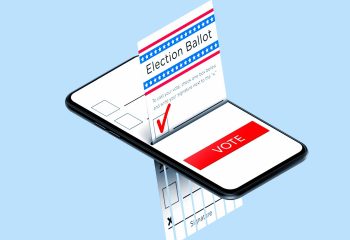
Americans are critical of technology companies despite changes to misinformation policies
As Election Day approaches, Americans remain concerned about the role that major internet companies play in U.S. democracy. In recent months, companies such as Facebook, Twitter and Google have begun actively managing content shared on their platforms — especially information concerning the coronavirus pandemic and the 2020 election. But, new polling from Gallup and Knight Foundation finds that the public maintains deep misgivings about these companies’ approaches to handling misinformation. At the same time, Americans have become less likely to favor free expression on social media.
These findings are from a Sept. 11-24 survey of 1,269 U.S. adults who are members of Gallup’s probability-based national panel. This survey builds on previous research that Gallup and Knight conducted in early December of last year, before the global pandemic, which found that techlash in America is widespread and bipartisan.
The main takeaways from the September 2020 survey include:
1. Americans continue to be concerned most about their personal data and misinformation online.
The vast majority of Americans say they are “very” or “somewhat” concerned about two issues: the privacy of personal data online (94%) and the spread of misinformation on the internet (93%, including 74% who are very concerned).
Most U.S. adults are also at least somewhat concerned about the remaining five issues: the size and power of large news media companies (84%) and large technology companies (84%), online hate speech and other abusive or threatening language (80%), online foreign interference in U.S. elections (75%), and political ads on the internet (65%).
Since December 2019, before the onset of the pandemic, concern has decreased significantly on four of the issues, as measured by the percentages who are very concerned. These include the privacy of personal data (down 9 percentage points), the size and power of news media companies (down 7 points), the size and power of technology companies (down 5 points), and political ads on the internet (down 5 points).
Meanwhile, there is no significant change in the percentages of those very concerned about the spread of misinformation on the internet, online hate speech and online foreign interference in U.S. elections.
Most of the decline in concern on these issues since December 2019 has been among Democrats and independents more than Republicans. The primary exception is that Republicans show a greater drop in concern about privacy online than Democrats do.
Regarding what the government should do to address each of these issues, majorities support the government taking “a major role” in dealing with online foreign interference in U.S. elections (80%) and the privacy of personal data online (67%). More than seven in 10 support the government having at least “a minor role” in tackling the other five issues. These figures are virtually unchanged since Americans were polled on these issues in December 2019.
2. The public is critical of how technology companies deal with potentially harmful content.
Seventy-five percent of Americans say they have heard “a great deal” (22%) or “a fair amount” (53%) about social media companies’ attempts to handle potentially harmful content that appears on their websites and apps. In assessing how social media companies are dealing with online content that might be considered harmful to some people, a slim 52% majority of U.S. adults say the companies are “not tough enough,” while 21% say they are “about right,” and 26% say they are “too tough.” Since March, there has been a slight increase in the percentage who feel the companies are too tough and a slight decline in perceptions that they are about right.
There is a wide partisan divide on attitudes toward social media companies’ removal of potentially harmful content. Eighty percent of Democrats and a 47% plurality of independents think social media companies are not tough enough, but 56% of Republicans say they are too tough when it comes to removing harmful content.
3. Americans have become less likely to favor free expression on social media platforms.
The public favors free expression over restrictions on social media. Fifty-six percent of U.S. adults believe people should be able to freely express their views on social media, even if their views are offensive, and 44% say people should be restricted based on societal norms and what is fair or appropriate.
Yet, Americans’ support for free expression on social media has eroded since December, when 65% favored it and 35% said they would prefer some restrictions on what people can say on such channels. Since then, President Donald Trump, lawmakers and the Federal Communications Commission have increasingly called for changes to Section 230, the law that allows internet platforms to moderate content on their sites.
Partisanship is the greatest driver of views on this measure, and most of the shift since December is due to Democrats who have become much more likely to call for restrictions. While a majority of Democrats (67%) think people should be restricted in what they can say if their content violates certain standards, majorities of Republicans (78%) and independents (63%) favor fewer limits on expressing their views online, including those that may be considered offensive.
Despite the shift in attitudes on free expression online, at least half of U.S. adults are “very concerned” that increased steps by major internet companies to exclude certain news items they see as problematic may result in four negative consequences. These include providing a biased picture of the news (62%), increasing the influence of news that benefits the company and their points of view (57%), restricting the expression of certain viewpoints (52%), and increasing the influence of certain news organizations over others (50%).
The current levels of concern are similar to the previous findings in a 2018 Gallup/Knight survey.
Attitudes on the influence of such decisions by social media companies vary widely by political party, with broad majorities of Republicans and far fewer Democrats expressing concern about each item. For instance, while 84% of Republicans are very concerned about restricting the expression of certain points of view, 53% of independents and 27% of Democrats feel the same. Similar patterns are seen for the three remaining potential consequences.
The public’s overall view of content moderation has not changed meaningfully compared to the findings of a March 2020 Gallup/Knight poll. Facebook first announced in 2018 that it would be creating an independent content oversight board to help set policy, and while the board has not yet begun its work, its members were announced in May 2020, and the company says it expects work to begin this month.
Given a choice, Americans remain more likely to favor independent boards reviewing the decisions made by social media companies about what can and cannot appear on their sites (47%) than to support the companies themselves (18%) or the federal government (5%) doing so. A substantial minority of 29% of U.S. adults do not think any of these entities should make such decisions.
Again, partisans’ views diverge, as 60% of Democrats prefer that independent boards review social media companies’ decisions, while 52% of Republicans do not think any of the entities should decide what can and cannot appear on social media websites and apps.
5. Americans would like to see the government pay more attention to technology issues.
Half of Americans say they have heard “a great deal” (9%) or “a fair amount” (41%) about attempts by the federal government to regulate how large internet companies operate in the U.S.
Sixty-two percent say elected officials and political candidates are not paying enough attention to issues related to technology and technology companies. At the same time, 30% say they are paying the right amount of attention. These figures are largely unchanged since December 2019.
Partisans are similar in their views on this measure, with majorities across party lines saying government officials are paying too little attention to technology issues.
Image (top) by Michael Cox on Unsplash.








